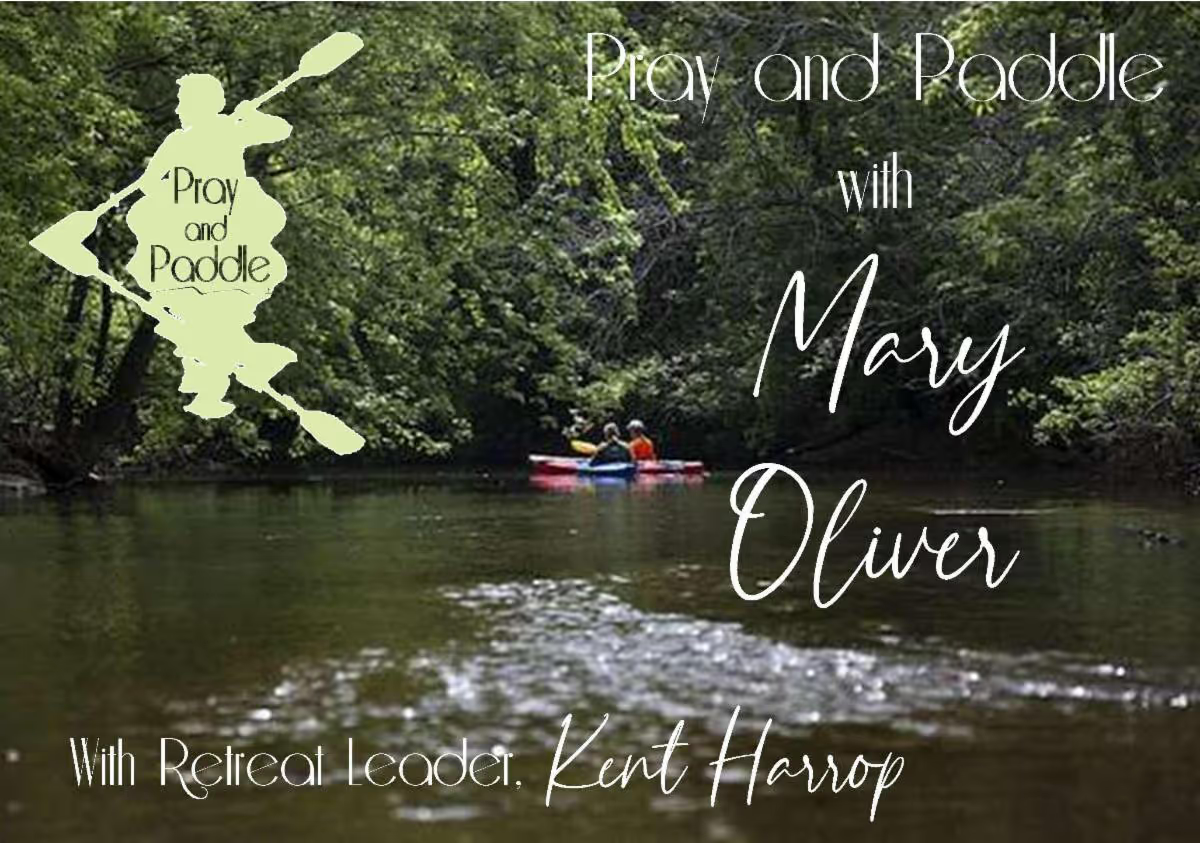June 1, 2025
.avif)
On the first Sunday of the month, we’re asking members of our Rolling Ridge community to share how their spiritual lives were transformed by the great heroes of faith. (Read the series introduction here.)
Today's article is written by Susan Stuart, a spiritual director, educator, grandmother, mother, and wife. We invite you to pause and read Susan's reflections on her spiritual hero, Mary Oliver, as she seeks wisdom for her journey through "The Journey."
“Tell me, what is it you plan to do with your one wild and precious life?” This last line of Mary Oliver’s poem, "The Summer Day" (see poem below) is the one that brought me to come to understand her as a spiritual hero.
Mary Oliver (1935-2019) published numerous volumes of poetry and prose. She won the Pulitzer Prize in 1984 and the National Book Award in 1992.Though she was never ordained, I experience her as a theologian whose seminary was the natural world and the outdoors.
Spiritual directors are deep listeners. Mary Oliver was a deep looker. And shouldn’t we strive to be both on our spiritual journeys? Mary helps me make that shift from communicating with God through speech to communing with God through the gaze of love and wonder. As such she is a poet for all seasons and all emotions.
With poetic simplicity, her poems explore such themes as despair, surviving your past, grief, sadness, loneliness, and death in a way that invites us into unexpected joy and curiosity. Her words can be soft and beautiful as well as harsh and relentless in the same poem. She can meld concrete images with abstract emotions that bring the reader to a shared experience of wonder. Using the pronoun “I”, she brings you alongside of her as the looker and gazer. You are with her in the poem.
It is a challenge to highlight just a few of her poems from her published works of more than 25 books. If you are a Mary Oliver fan, you have your list of favorites. Here are a few highlights of lines from her poems for me:

When the first Rolling Ridge email in January asked about submissions for the Spiritual Heroes series, I was trying to process Mary Oliver’s poem, "The Journey," in the context of our cultural and political climate.
The Journey
One day you finally knew
what you had to do, and began
though the voices around you
kept shouting
their bad advice—
though the whole house
began to tremble
and you felt the old tug
at your ankles.
“Mend my life!”
each voice cried.
But you didn’t stop.
You knew exactly what you had to do,
though the wind pried
with its stiff fingers
at the very foundations,
though their melancholy
was terrible.
It was already late
enough, and a wild night,
and the road full of fallen
branches and stones.
But little by little,
as you left their voices behind,
the stars began to burn
through the sheets of clouds,
and there was a new voice
which you slowly recognized as your own,
that kept you company
as you strode deeper and deeper
into the world,
determined to do
the only thing you could do—
determined to save
the only life you could save.
Mary Oliver always conjures images of being outside and near the ocean. Whenever I read her poetry or prose, it is with a feeling of expansiveness, fresh air, night breezes and moonlit vistas.
But the beginning of "The Journey" is not that. It's indoors with trembling, tugging, crying, wind howling, and terrible melancholy. I'm not sure when Mary Oliver wrote this poem but "one day" could have been any of the many days leading up to today or since.
Unfortunately, Oliver's outside in the poem isn't any more appealing: wild night, fallen branches, and roads full of stones. She says, "it was already late enough." But is it too late? What just happened? What did we do or not do? What do we do now?
The spiritual heroism of Oliver then creeps in as she says, "But" and signals that the spiritual journey is about to begin. Not with a big thundering clap of thunder but "little by little." In my mind's eye I see her slowly stand and stop in the middle of the chaotic living room, motioning with one finger silently saying, "Come with me."
Her call is met with an exhalation of relief and a common response of late: leave the "voices behind" -- turn off the TV, turn off the news, shut down the apps, block all the emails, just make it all stop -- at least just for a day -- please. The relief is joined with a heavy tiredness: But I've been so invested in all of this for so long, I don't think I can keep doing this, I'm sooooo tired.
"You knew exactly what you had to do," or just that you knew you couldn't keep doing what you had been doing. So, you go outside, literally or figuratively, and leave all of the voices on the television, on the radio, on your phone, and in your head behind. Oliver's spiritual gift, for me, has always been to take us outside, outside of ourselves, to see the world as God sees, to show us what it truly means to be in the Presence of God, in the presence of what is true, kind and beautiful.
Oliver's spiritual gift, for me, has always been to take us outside, outside of ourselves, to see the world as God sees, to show us what it truly means to be in the Presence of God, in the presence of what is true, kind and beautiful.
When you have been nose-to-the-screen without ceasing for a long time, coming back to your own voice is not an easy transition. "The stars have to burn through the sheet of clouds” because it is so thick and dense. How did we let ourselves get here?
Dear God, what have I done?
Oliver reminds us we are not alone; we have company as we move deeper and deeper into the outside world, deeper and deeper back to ourselves, deeper and deeper back to our own voice, deeper and deeper from aloneness to solitude. And then the rub -- "determined to do the only thing you could do, determined to save the only life you could save." Wait a minute! What? What am I saving? And I'm supposed to know this is the only thing to do?
Honestly, I had to let Mary Oliver's poem sit for a while after I read it. Let it permeate amidst all of the clatter I'm trying to eradicate from my brain. Then as God so often does, I was presented with another way to process "The Journey."
This winter I was helping my 10-year-old grandson learn about backyard birds. We put out a seed feeder and two suet feeders and enjoyed watching the different birds come to feed. One Sunday morning in January, we saw a hawk on the ground near the feeder with something in its claws and blood seeping out onto the snow underneath. The hawk swooped up to the nearby woodpile with a frozen squirrel and proceeded to devour it for the next several hours. Nature. Reality. And Mary Oliver's voice saying, "I never said going back outside was going to be easy."
As Oliver so deftly crafts in her poem, I am attempting to do the only thing I can do, determined to save the only life (country?) I can save. By finding a new voice, my own voice, and joining it with others - to embark on the journey. Upon discovering this poem, I also uncovered the sheet music for a hymn, "We Need Each Other's Voice to Sing." The hymn ends with, "We need each other's voice to sing, each other's strength to love, each other's views to help us bring our hearts to God above, our lives like coals placed side by side to feed each other's flame, shall with the Spirit's breath provide a blaze of faith to claim. Alleluia, Alleluia, Praise, O Praise the Lord!"
__________________________________________________

The Summer Day
Who made the world?
Who made the swan, and the black bear?
Who made the grasshopper?
This grasshopper, I mean--
the one who has flung herself out of the grass,
the one who is eating sugar out of my hand,
who is moving her jaws back and forth instead of up and down--
who is gazing around with her enormous and complicated eyes.
Now she lifts her pale forearms and thoroughly washes her face.
Now she snaps her wings open, and floats away.
I don't know exactly what a prayer is.
I do know how to pay attention, how to fall down
into the grass, how to kneel in the grass,
how to be idle and blessed, how to stroll through the fields,
which is what I have been doing all day.
Tell me, what else should I have done?
Doesn't everything die at last, and too soon?
Tell me, what is it you plan to do
With your one wild and precious life?
(Mary Oliver in New and Selected Poems, 1992)
The Uses of Sorrows
Someone I loved once gave me
a box full of darkness.
It took me years to understand
that this, too, was a gift.
(Mary Oliver in Thirst: Poems, 2007)
